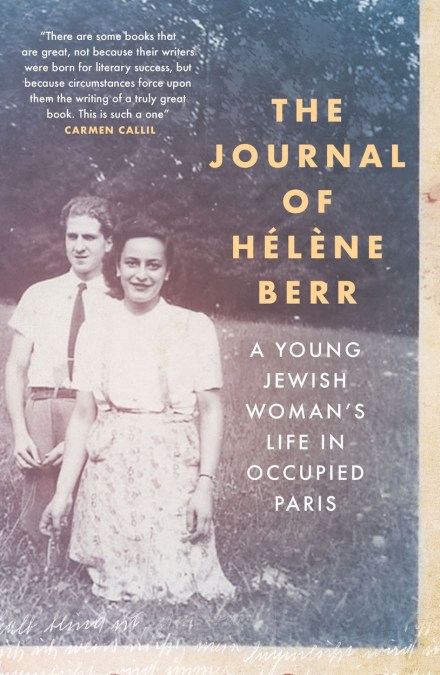The Journal of Hélène Berr
“At once the diary of a young Jewish girl under the German Occupation of Paris, a work of exceptional literary quality, and a powerful historical document” SIMONE VEIL
From April 1942 to February 1944, Hélène Berr, a recent graduate of the Sorbonne, kept a journal that is both an intensely moving, intimate, harrowing, appalling document and a text of astonishing literary maturity.
With her friends and family, she plays the violin and she seeks refuge from the everyday in what she calls the “selfish magic” of English literature and poetry. But this is Paris under the occupation and her family is Jewish.
“There are some books that are great, not because their writers were born for literary success, but because circumstances force upon them the writing of a truly great book. Such a one is Hélène Berr’s Journal” CARMEN CALLIL
Eventually, there comes the time when all Jews are required to wear a yellow star. She tries to remain calm and rational, keeping to what routine she can: studying, reading, enjoying the beauty of Paris. Yet always there is fear for the future, and eventually, in March 1944, Hélène and her family are arrested, taken to Drancy Transit Camp and soon sent to Auschwitz. She was – as was later discovered – transferred from Auschwitz to the camp of Bergen Belsen towards the end of October. She caught typhus and was killed by a female guard, just five days before the liberation of the camp. The last words in the journal she had left behind in Paris were “Horror! Horror! Horror!”, a hideous and poignant echo of her English studies.
Hélène Berr’s story is almost too painful to read, foreshadowing horror as it does amidst an enviable appetite for life, for beauty, for literature, for all that lasts.
Translated from the French by David Bellos
From April 1942 to February 1944, Hélène Berr, a recent graduate of the Sorbonne, kept a journal that is both an intensely moving, intimate, harrowing, appalling document and a text of astonishing literary maturity.
With her friends and family, she plays the violin and she seeks refuge from the everyday in what she calls the “selfish magic” of English literature and poetry. But this is Paris under the occupation and her family is Jewish.
“There are some books that are great, not because their writers were born for literary success, but because circumstances force upon them the writing of a truly great book. Such a one is Hélène Berr’s Journal” CARMEN CALLIL
Eventually, there comes the time when all Jews are required to wear a yellow star. She tries to remain calm and rational, keeping to what routine she can: studying, reading, enjoying the beauty of Paris. Yet always there is fear for the future, and eventually, in March 1944, Hélène and her family are arrested, taken to Drancy Transit Camp and soon sent to Auschwitz. She was – as was later discovered – transferred from Auschwitz to the camp of Bergen Belsen towards the end of October. She caught typhus and was killed by a female guard, just five days before the liberation of the camp. The last words in the journal she had left behind in Paris were “Horror! Horror! Horror!”, a hideous and poignant echo of her English studies.
Hélène Berr’s story is almost too painful to read, foreshadowing horror as it does amidst an enviable appetite for life, for beauty, for literature, for all that lasts.
Translated from the French by David Bellos
Newsletter Signup
By clicking ‘Sign Up,’ I acknowledge that I have read and agree to Hachette Book Group’s Privacy Policy and Terms of Use
Reviews
At once the diary of a young Jewish girl under the German Occupation of Paris, a work of exceptional literary quality, and a powerful historical document
Searingly beautiful Holocaust diary... with a fluid and compelling combination of raw sensitivity, moral questioning and courageous pragmatism ... a vital, spellbinding read
There are some books that are great, not because their writers were born for literary success, but because circumstances force upon them the writing of a truly great book. Such a one is Hélène Berr's Journal
At once the diary of a young Jewish girl under the German Occupation of Paris, a work of exceptional literary quality, and a powerful historical document
Searingly beautiful Holocaust diary... with a fluid and compelling combination of raw sensitivity, moral questioning and courageous pragmatism ... a vital, spellbinding read
There are some books that are great, not because their writers were born for literary success, but because circumstances force upon them the writing of a truly great book. Such a one is Hélène Berr's Journal
This is a voice and a presence that will stay with us for the rest of our lives

